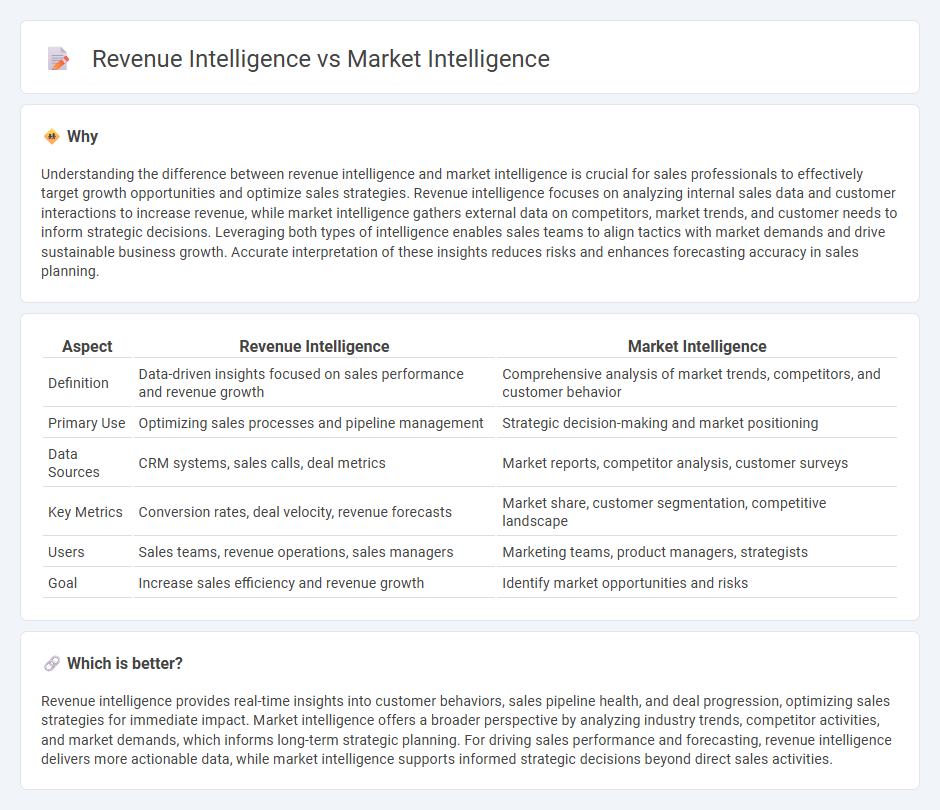
Revenue intelligence focuses on analyzing sales data to optimize revenue growth by tracking customer behavior, sales performance, and forecasting future income. Market intelligence involves gathering comprehensive insights about competitors, market trends, and consumer preferences to inform strategic decisions. Explore the key differences between revenue intelligence and market intelligence to enhance your sales strategy.
Why it is important
Understanding the difference between revenue intelligence and market intelligence is crucial for sales professionals to effectively target growth opportunities and optimize sales strategies. Revenue intelligence focuses on analyzing internal sales data and customer interactions to increase revenue, while market intelligence gathers external data on competitors, market trends, and customer needs to inform strategic decisions. Leveraging both types of intelligence enables sales teams to align tactics with market demands and drive sustainable business growth. Accurate interpretation of these insights reduces risks and enhances forecasting accuracy in sales planning.
Comparison Table
| Aspect | Revenue Intelligence | Market Intelligence |
|---|---|---|
| Definition | Data-driven insights focused on sales performance and revenue growth | Comprehensive analysis of market trends, competitors, and customer behavior |
| Primary Use | Optimizing sales processes and pipeline management | Strategic decision-making and market positioning |
| Data Sources | CRM systems, sales calls, deal metrics | Market reports, competitor analysis, customer surveys |
| Key Metrics | Conversion rates, deal velocity, revenue forecasts | Market share, customer segmentation, competitive landscape |
| Users | Sales teams, revenue operations, sales managers | Marketing teams, product managers, strategists |
| Goal | Increase sales efficiency and revenue growth | Identify market opportunities and risks |
Which is better?
Revenue intelligence provides real-time insights into customer behaviors, sales pipeline health, and deal progression, optimizing sales strategies for immediate impact. Market intelligence offers a broader perspective by analyzing industry trends, competitor activities, and market demands, which informs long-term strategic planning. For driving sales performance and forecasting, revenue intelligence delivers more actionable data, while market intelligence supports informed strategic decisions beyond direct sales activities.
Connection
Revenue intelligence integrates data from sales activities and customer interactions to provide actionable insights that drive revenue growth. Market intelligence offers comprehensive analysis of market trends, competitor strategies, and customer behavior, which informs the revenue intelligence process. Together, these intelligence types enable sales teams to align their strategies with market demands, optimizing revenue generation and competitive advantage.
Key Terms
**Market Intelligence:**
Market intelligence involves gathering and analyzing data about market trends, competitor activities, and customer preferences to inform strategic business decisions. It leverages tools like SWOT analysis, market segmentation, and consumer behavior studies to identify growth opportunities and mitigate risks. Explore how market intelligence can transform your business strategies and drive competitive advantage.
Competitor Analysis
Market intelligence encompasses comprehensive competitor analysis by gathering and analyzing data on competitor strategies, market positioning, and industry trends to identify opportunities and threats. Revenue intelligence focuses on leveraging sales and customer data to uncover revenue-driving behaviors, optimize sales processes, and anticipate competitor moves impacting revenue streams. Explore how integrating market intelligence and revenue intelligence can enhance competitive advantage and drive growth.
Market Trends
Market intelligence revolves around analyzing market trends, customer behavior, and competitive dynamics to inform strategic decisions, while revenue intelligence prioritizes tracking sales data, pipeline performance, and revenue opportunities to optimize sales processes. Market trends data, such as shifts in consumer preferences and emerging technologies, are central to market intelligence, enabling companies to anticipate market changes and adapt accordingly. Explore the distinct roles of market intelligence and revenue intelligence to better leverage data-driven insights for business growth.
Source and External Links
How to Develop Market Intelligence for Your Business - This article provides insights into developing market intelligence, including types of intelligence and how to gather data for informed business decisions.
Market Intelligence and How You Should Use It - Qualtrics discusses types of market intelligence, including competitor, product, market, and customer understanding, to help businesses make strategic decisions.
Market Intelligence - Wikipedia defines market intelligence as the gathering and analysis of information about a company's market, trends, competitors, and customers to inform strategic planning.
 dowidth.com
dowidth.com